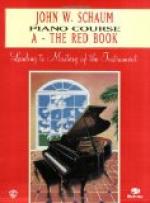The summer of 1913 in Europe proved to be a veritable musical pilgrimage, the milestones of which were the homes of the famous artists, who generously gave of their time and were willing to discuss their methods of playing and teaching.
The securing of the interviews has given the author satisfaction and delight. She wishes to share both with the fellow workers of her own land.
The Talks are arranged in the order in which they were secured.
PIANO MASTERY
PIANO MASTERY
I
IGNACE JAN PADEREWSKI
One of the most consummate masters of the piano at the present time is Ignace Jan Paderewski. Those who were privileged to hear him during his first season in this country will never forget the experience. The Polish artist conquered the new world as he had conquered the old; his name became a household word, known from coast to coast; he traveled over our land, a Prince of Tones, everywhere welcomed and honored. Each succeeding visit deepened the admiration in which his wonderful art was held.
The question has often been raised as to the reason of Paderewski’s remarkable hold on an audience; wherein lay his power over the musical and unmusical alike. Whenever he played there was always the same intense hush over the listeners, the same absorbed attention, the same spell. The superficial attributed these largely to his appearance and manner; the more thoughtful looked deeper. Here was a player who was a thoroughly trained master in technic and interpretation; one who knew his Bach, Beethoven, Chopin, Schumann and Liszt. These things of themselves would not hold an audience spellbound, for there were other artists equally well equipped. In a final analysis it was doubtless Paderewski’s wonderful piano tone, so full of variety and color, so vital with numberless gradations of light and shade, that charmed and enthralled his listeners. It mattered to no one—save the critics—that he frequently repeated the same works. What if we heard the Chromatic Fantaisie a score of times? In his hands It became a veritable Soliloquy on Life and Destiny, which each repetition invested with new meaning and beauty. What player has ever surpassed his poetic conception of Schumann’s Papillons, or the Chopin Nocturnes, which he made veritable dream poems of love and ecstasy. What listener has ever forgotten the tremendous power and titanic effect of the Liszt Rhapsodies, especially No. 2? When Paderewski first came to us, in the flush of his young manhood, he taught us what a noble instrument the piano really is in the hands of a consummate master. He showed us that he could make the piano speak with the delicacy and power of a Rubinstein, but with more technical correctness; he proved that he could pierce our very soul with the intensity of his emotion, the poignant, heart-searching quality of his tones, the poetry and beauty of his interpretation.




